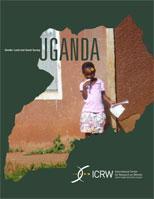 Strengthening property rights in rural Uganda is tough enough with the country ranked 150 out of 183 on the World Bank’s Doing Business Indicators for Registering Property. Now try strengthening property rights for women in Uganda, the kind of place where women typically don’t receive child custody in cases of divorce.
Strengthening property rights in rural Uganda is tough enough with the country ranked 150 out of 183 on the World Bank’s Doing Business Indicators for Registering Property. Now try strengthening property rights for women in Uganda, the kind of place where women typically don’t receive child custody in cases of divorce.
That’s just what the International Center for Research on Women (ICRW) did in a pilot project the results of which they presented yesterday at ICRW’s Washington, D.C. headquarters.
ICRW Economists Krista Jacobs and Meredith Saggers began the presentation with an overview of the earlier Gender Land & Asset Survey (GLAS) that provided a foundation for ICRW’s pilot program to advance women’s property rights in Uganda. Covering land, housing, material goods, and livestock, the survey defined asset rights broadly as perceived ownership, documentation, and the extent to which one could influence decision-making regarding the asset.
The survey also covered usage of assets, which turned out some interesting insights. While there was little to no gap in usage of assets, there is a huge gap in favor of men when it comes to perceived ownership and ultimate decision-making.
But perhaps the most interesting insights from the survey came from dis-aggregating the data between male-headed households and female-headed households. For example, in rural Ugandan male-headed households 19 percent of women perceived joint-ownership of the home while only 3 percent of men in the same households perceived joint-ownership. On a more hopeful note, the gender gap in perceived ownership and control closes almost completely in female-headed households–though Jacobs noted later it was possible that the survey only reached the most successful and powerful female-headed households while the vast majority may tell a different story.
The survey also asked about factors affecting the strength of different asset rights for men versus women. While married women perceived weaker asset rights when it came to land and livestock, they did feel more secure in material property rights–items like tools and machinery for farming or cooking, transportation assets, and -of special significance- communications assets like mobile phones.
To put research in motion, the primary cue taken from the GLAS survey was that there was stark lack of awareness of property laws as they existed on the books. Thirty-seven percent of women in the Uganda survey didn’t have any idea which of Uganda’s multiple sanctioned land-tenure systems applied to their family’s land–even though recent laws passed do grant women greater access to and control of assets. The pilot project to strengthen women’s property rights in Uganda thus revolved around partnering with the Uganda Land Alliance (ULA) to train community-based rights workers from the Luwero Land Rights Activists Association in basic gender equity and property rights issues.
Community-based rights workers were community-selected volunteers, men and women, and rather than the impossible task of training them in just a matter of days to become experts in gender and property rights, ICRW and ULA trained them to serve more as resource hubs. Armed with basic knowledge of property rights and responsibilities as prescribed by law, they consulted with trusted experts, local leaders and institutions as well as each other as a network, and in so doing served as alternate dispute mechanisms in lieu of corrupt and dysfunctional courts.
As the ultimate source of solutions came down to enforcing the laws as they exist, in the author’s opinion these community-based rights workers were doing more than defending the rights of women to own and control assets; they were also helping more broadly to strengthen the rule of law.
ICRW foresees the information and networks that come out of the pilot project in Uganda will help advocacy efforts for further reform on property rights and other issues, Jacobs said. In particular she noted that laws and customs around joint-ownership in Uganda require further study, with an eye toward reform down the road to strengthen property rights for women. There are plenty of other laws currently or pending deliberation that could weaken or strengthen women’s asset rights, she added.
Depending on where you are and who is your target audience, property rights can be a source of hope or a source of great consternation. ICRW’s research and work on this issue as presented yesterday shined a light on the economic, social, legal, and political complexity around property rights that is fascinating no matter where you might fall on that spectrum.

